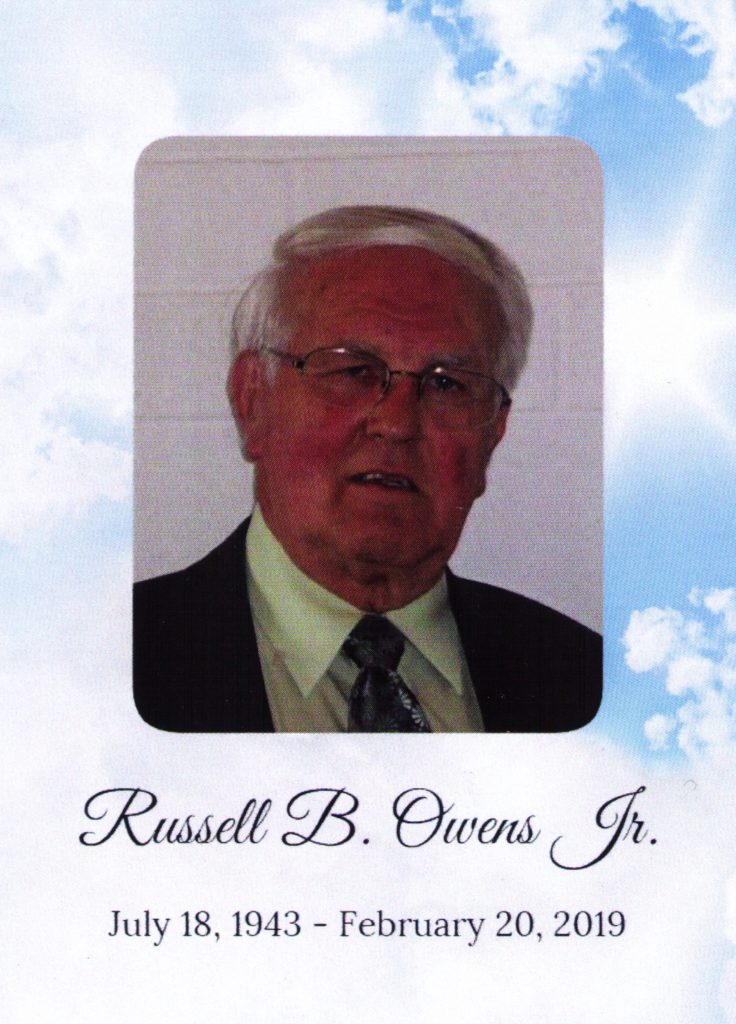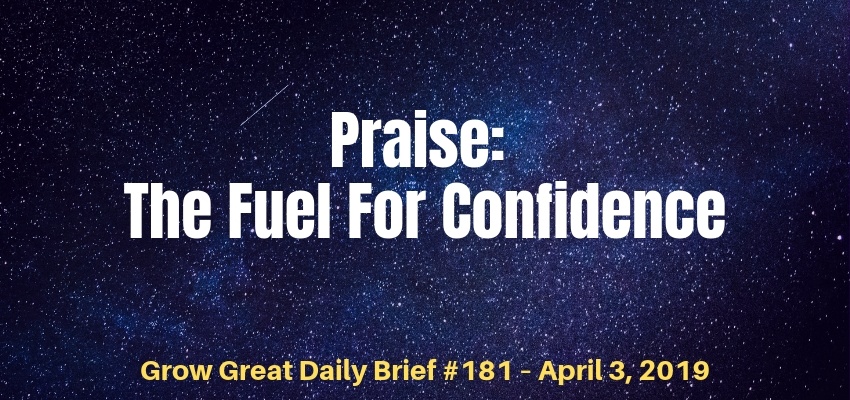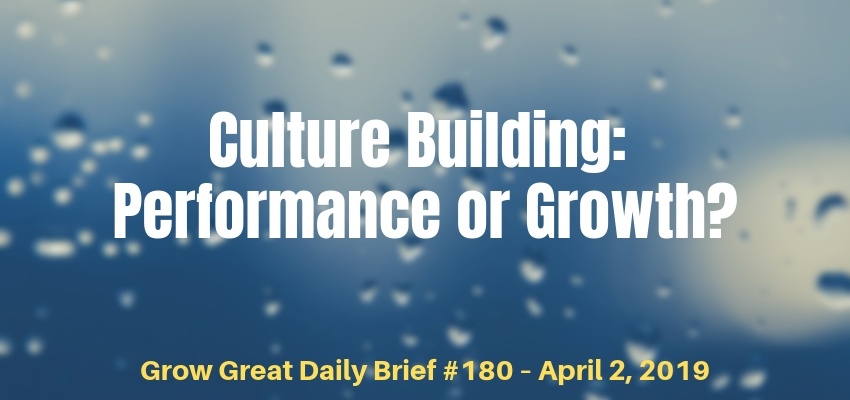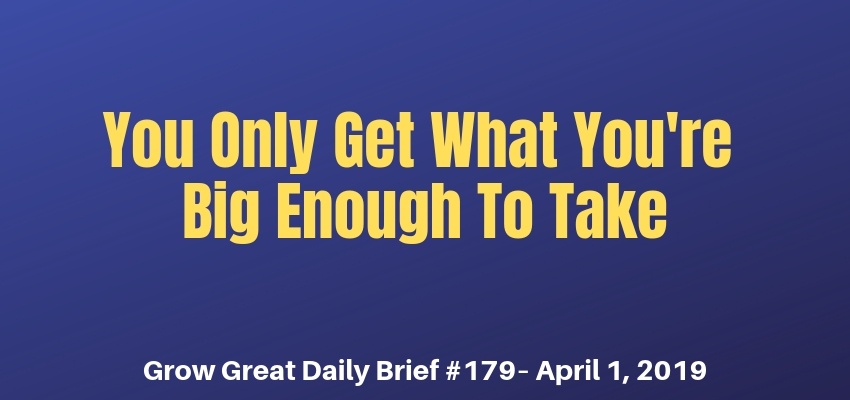Empathy: The Value Of An Historical Perspective (But In Real Time) – Grow Great Daily Brief #184 – April 8, 2019
Podcast: Play in new window | Download (Duration: 10:01 — 12.6MB)
Subscribe: Apple Podcasts | Spotify | RSS | More
I remember sitting in a college history class, The History Of Western Civilization and thinking about these ancient characters of the past. Here I am surrounded by hundreds of my not-so-close college friends, sitting in a class that should be anything but boring (why are so many college history professors boring?) wondering how many kids around the planet are being taught these same things. And how can history be somewhat united – more so than in real time – in judging why historical figures thought what they thought and did what they did?
What I love about history is, well…history. But I also love how we approach it.
Empathy is best summed up in a word: UNDERSTANDING.
Empathy toward others means we understand how they feel. We get it.
The real-time approach to discernment is heavy on judgment. Mostly, I think because it is in real-time. There’s little or no distance between the action and our judgment of it. In short, we judge it based on the facts, assumptions or opinions at hand. It’s the context easily at our disposal.
The historical approach to discernment is fairly low in judgment, even in a liberally-minded college campus. Mostly, because it’s not in real-time. There are often great distances between the action and our current judgment about whatever happened. In short, we judge it based on more facts, fewer assumptions, and more open-minded opinions. The context is filled with more information.
Last Friday morning during a conversation I mentioned this difference. Not sure where it came from, but as they say, “Even a blind pig can find one every now and again.” What I found was a way to communicate the value and benefit of applying a different viewpoint when we look at others. Particularly when we’re drawn to make a judgment that is mostly critical. One where we’re tempted to think (or even say), “I wouldn’t do that” or “I wouldn’t do it that way.”
History is history. It is what it is. There’s no changing it. No going back to fix whatever happened. Well, unless you believe in things like the Outlander.
This means our investment in it is primarily based in the desire to simply know. And understand. We want to figure out what happened and why. Why did those people do what they did? What prompted them to make the choices they made? History is largely based on answering those two questions: What and Why. What did they do. And why.
In real time, we often feel no need to ask either of those questions. I see what you did. I know what you did. And I know why you did it. And I completely disagree with it. You’re an idiot. In real time, we keep it neat and tidy. We also keep our dignity in knowing how much better we are. After all, we would have never done what you just did.
Perspective matters.
Claire and Jamie of Outlander fame prove a point. They find Jamie’s aunt in America. She owns a plantation with over 150 slaves. Claire, who has traveled in time back from the modern world is appalled at the mere notion of slavery. The aunt names Jamie the overseer of the estate and has decided to bestow it all to him. But Claire is unable to resolve the fact that in the 1800’s on places just like this plantation, slavery was real. She’s come from the future and has a context that isn’t congruent with the time in which she now finds herself. At Claire’s urging, Jamie refuses to make a life with Claire running the plantation. Never mind that the aunt was a fair person, treating the slaves more favorably than those around her. Never mind that Claire and Jamie may have been able to provide an even more fair situation for the slaves of the plantation. Freedom for slaves wasn’t easy or even probable at the time.
Claire’s knowledge and experience of the future disabled her to make what could have been a wiser decision. It would have certainly made her life with her husband easier. All proving the point that our context and the context of what we seek to understand — it matters. Claire believed slavery to be wrong and perhaps in real-time her judgment couldn’t be helped. The rest of society mostly accepted slavery as a way of life, even if they disagreed with it.
The founding fathers of our country aren’t judged based on real-time scrutiny. Do we make allowances for them? Of course, we do. Should we? Of course, we should.
I’ve got 5 grandkids. Ranging in age from 3 to almost 12. Do I make allowances for the 3-year-old that I won’t give to the almost-12-year-old? You bet. And I must. I should. They’re at different spots on the timeline of life. One knows infinitely more than the other. One has the emotional tools of a person four times the age of the other. Those are major differences. So it goes with an historical perspective.
However…
What about UNDERSTANDING? That’s at the heart of empathy. How can this factor in to helping us increase our empathy and leverage it in our leadership?
Two words. One a verb. One a noun.
SEEK.
CURIOSITY.
The verb is “seek.”
The noun is “curiosity.”
Put them together in a 2-word sentence. Seek curiosity.
Split them apart.
Seek understanding.
Be curious enough to seek understanding.
The thing about the historical perspective is that the further away we are from the event and the people involved, the less judgmental we tend to be about it all. The more we lean into trying to figure out why they did what they did. We simply seek to understand because we’re curious. Various things might fuel our curiosity, but the value is high. Are we seeking understanding so we can learn something about them…or about ourselves? I’m not sure the motive behind the understanding is as crucial as the act of trying to understand…trumped only by the success to understand.
Can we employ a historical perspective even when there’s very little time distance? Meaning, if the event just happened can we approach it as though it happened 100 years ago? Of course, we can. We’re humans with an incredible ability to project ourselves into situations and circumstances we’ve not experienced before. Our imaginations can serve us if we just exercise them more and more toward helping us understand.
Our biases destroy our ability. We all have bigotry about something or somebody. Blind spots caused by our opinions, assumptions, and viewpoints. Those fade as we look at things beyond the context of the present. That’s why we’re able to read, study and learn from our founding fathers without judging them too harshly, even if they were slave owners. It certainly isn’t because we’re willing to believe slavery is right, or that it was even right at that time. We’re able to view the people and events in the time, considering the circumstances of their lives – not ours. And that’s the key to understanding. Stop considering the context of your life. Instead, consider the context of the lives of the people you’re trying to understand.
Is it easy? Not in real-time. Engage your imagination and tack 100 years onto it, then give it a try. Remove yourself from the process. Stop being self-centered. It’s hampering your empathy, serving nobody!
Be well. Do good. Grow great!
RC
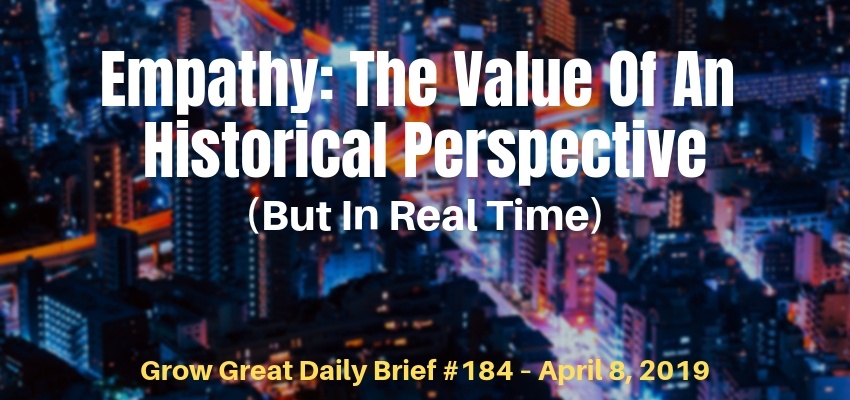
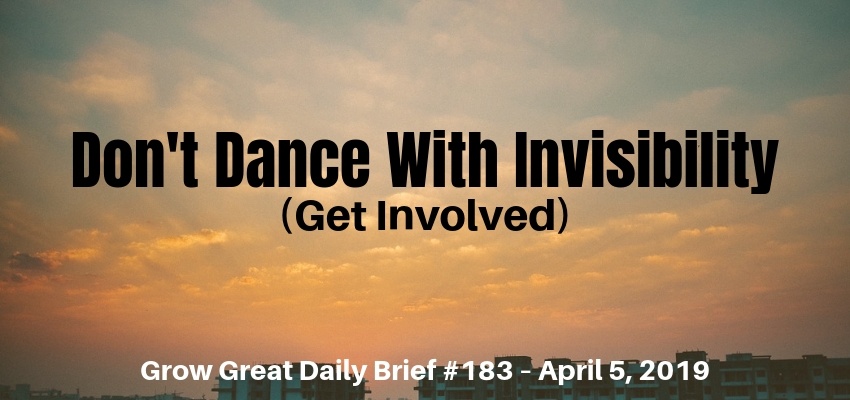
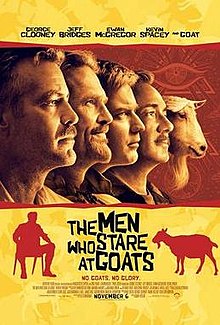 The line came from a bit of dialogue in a 2009 movie featuring George Clooney, The Men Who Stare At Goats. Clooney plays Lyn Cassady. Bob is a reporter friend inquiring about Lyn’s life.
The line came from a bit of dialogue in a 2009 movie featuring George Clooney, The Men Who Stare At Goats. Clooney plays Lyn Cassady. Bob is a reporter friend inquiring about Lyn’s life.
